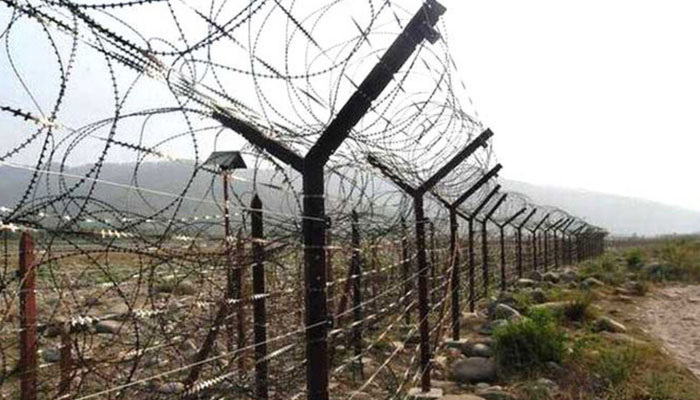Indian troops conduct war games near Pakistan border
The exercise under a major general rank officer was carried out in Naliya near the Pakistani border. There are important Indian Air Force and military bases in and around the Naliya town, which is part of the Kutch district, international media reported.
NEW DELHI/WASHINGTON: The Indian armed forces special operations division has carried out its first war games near the Pakistan border in Gujarat. The first exercise was codenamed ‘Exercise Smelling Field’.
The exercise under a major general rank officer was carried out in Naliya near the Pakistani border. There are important Indian Air Force and military bases in and around the Naliya town, which is part of the Kutch district, international media reported.
During the war games, in which commandos of Indian army, navy and air force took part, the special forces operatives practiced counter-terrorism operations and other drills on situations that can emerge while tackling terrorism. The tri-service special operations division was raised recently. Other newly raised tri-service forces that will be force multipliers in all future conflicts, including peacetime threats, include cyber agency, and space agency.
Meanwhile, Indian External Affairs Minister S Jaishankar, who is on a three-day trip to Washington, DC, Monday defended India’s right to buy a missile defence system from Russia despite the threat of sanctions from the United States. The minister said India was discussing the US concerns but declined to forecast the ultimate decision on the fate of the S-400 purchase from Russia.
“We have always maintained that what we buy -- the sourcing of military equipment -- is very much a sovereign right,” he told reporters ahead of a meeting with Secretary of State Mike Pompeo.
“We would not like any state to tell us what to buy or not to buy from Russia any more than we would like any state to tell us to buy or not buy from America,” he said. “That freedom of choice is ours and we think it’s in everybody’s interest to recognise that,” he said.
Last year, India agreed to buy five S-400 systems for $5.2 billion, and Russia has said that delivery is on track. Under a 2017 law, the United States imposes sanctions against countries over “major” arms purchases from Russia due to Moscow’s military involvement in Ukraine and Syria and alleged meddling in US elections.
In June, Turkey angered the United States by alsogoing ahead with an S-400 purchase. President Donald Trump responded by ending Turkey’s involvement in the F-35 fighter jet programme but has yet to announce other sanctions.
Jaishankar hailed warm relations overall with the United States but underlined India’s differences with Trump’s hawkish stance on Iran. The United States has threatened sanctions to force all countries to stop buying oil from Iran as it seeks to curb Tehran’s influence in the Middle East.
In May, the Trump administration ended waivers for countries including India, formerly a leading customer for Iranian oil. “We view Iran from the east, and from the east Iran has been a very stable, status quo power,” Jaishankar said.
For India, “we’ve been repeatedly assured that the affordable and predictable access to energy will not change,” he said, declining to comment further on discussions on Iran. India has been teaming up to expand Iran’s Chabahar port, a way to ensure a supply route to Afghanistan that bypasses Pakistan.
-
 Savannah Guthrie Mom Update: Unexpected Visitors Spark Mystery Outside Nancy's Home
Savannah Guthrie Mom Update: Unexpected Visitors Spark Mystery Outside Nancy's Home -
 Elle Fanning Shares Detail About Upcoming Oscars Night Plan With Surprise Date
Elle Fanning Shares Detail About Upcoming Oscars Night Plan With Surprise Date -
 Demi Lovato Spills Go-to Trick To Beat Social Anxiety At Parties
Demi Lovato Spills Go-to Trick To Beat Social Anxiety At Parties -
 Benny Blanco Looks Back At The Time Selena Gomez Lost Her Handrwritten Vows Days Before Wedding
Benny Blanco Looks Back At The Time Selena Gomez Lost Her Handrwritten Vows Days Before Wedding -
 Naomi Watts Reveals Why She Won't Get A Facelift In Her 50s
Naomi Watts Reveals Why She Won't Get A Facelift In Her 50s -
 Travis Kelce's Mom Donna Fires Back At Critic With Sarcastic Reply After Body Jab
Travis Kelce's Mom Donna Fires Back At Critic With Sarcastic Reply After Body Jab -
 Kendall Jenner Gets Candid About Her Differences With The Kardashian Clan Over Style Choices
Kendall Jenner Gets Candid About Her Differences With The Kardashian Clan Over Style Choices -
 Sam Altman Opens Up About OpenAI, Anthropic, Pentagon Conflict
Sam Altman Opens Up About OpenAI, Anthropic, Pentagon Conflict -
 Brenda Song Confesses Fascination With Conspiracy Theories
Brenda Song Confesses Fascination With Conspiracy Theories -
 Lunar Eclipse 2026: Time, Date, Sighting Locations, Know Every Detail
Lunar Eclipse 2026: Time, Date, Sighting Locations, Know Every Detail -
 Death Toll Climbs To 54 As Floods Wreck South-eastern Brazil
Death Toll Climbs To 54 As Floods Wreck South-eastern Brazil -
 Katie Price Drops Bombshell Plan To Cash In On Marriage
Katie Price Drops Bombshell Plan To Cash In On Marriage -
 Ryan Gosling Shares How Daughters' 'honest' Feedback Keeps Him Grounded
Ryan Gosling Shares How Daughters' 'honest' Feedback Keeps Him Grounded -
 Neve Campbell Explains Why She Avoids Watching Scary Movies As She Returns To 'Scream 7'
Neve Campbell Explains Why She Avoids Watching Scary Movies As She Returns To 'Scream 7' -
 Milan Tram Crash Leaves Two Dead, 39 Injured
Milan Tram Crash Leaves Two Dead, 39 Injured -
 Timothee Chalamet Touches On His Personality's Relatability With 'Marty Supreme' Role
Timothee Chalamet Touches On His Personality's Relatability With 'Marty Supreme' Role




